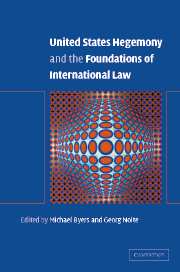Preface
Published online by Cambridge University Press: 13 July 2009
Summary
This volume represents the culmination of a two-year project that began with an informal debate in Göttingen in May 2000. The question then, as now, was whether the current predominance of the United States is leading to foundational change in the international legal system – and if so, how.
Our interest in the issue of foundational change and the impact of geopolitics on international law is derived in part from the work of Wilhelm G. Grewe, who, in his Epochen der Völkerrechtsgeschichte, argued that successive dominant powers have always contributed decisively to changing the international legal system. And yet Grewe, in an epilogue to the English version of his book, in 1998 suggested that the post-Cold War epoch might be different, in that the development of an “international community” could promote a reshaping of the foundations of the international legal system in a different direction, so as to favor global interests rather than simply the national interests of the United States – the dominant power of our time.
Ten years after the fall of the Berlin Wall, it seemed to us time for a preliminary evaluation of the situation. We identified six areas or concepts for examination: international community, sovereign equality, the law governing the use of force, customary international law, the law of treaties, and compliance. Although hardly exhaustive of the areas and concepts worthy of examination, in our view these six categories provided a broad overview of important foundational aspects that might possibly be undergoing change.
- Type
- Chapter
- Information
- United States Hegemony and the Foundations of International Law , pp. xv - xviiiPublisher: Cambridge University PressPrint publication year: 2003

